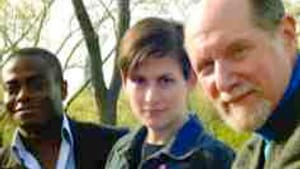Do I hear a clarinet?
Schumann Trio's debut

It was one of those concerts you can wait for all season. The Schumann Trio, in its Philadelphia debut and only its second public appearance, gave outstanding performances Sunday of its repertoire of clarinet chamber music.
Word had gotten out somehow, because the American Philosophical Society's auditorium was packed, right to the last temporary chair added in the back of the balcony. Lengthy applause and shouts at the concert's conclusion testified to the pleasure the trio's music delivered.
Unlike the homogenized looks of many chamber groups, the Schumanns let you know this is a repertoire-driven grouping from their entrance. Violist Michael Tree is a chamber music eminence at 75, a co-founder of the Guarneri Quartet, and obviously a rail-splitter in an earlier life. Clarinetist Anthony McGill is only 30 and a rising star, a principal player with the Metropolitan Opera Orchestra and a refreshing African-American face in the chamber-music world, who played at President Obama's inauguration with Itzhak Perlman. The Russian-born pianist Anna Polonsky brings her beauty and great accompanist skills to round out the trio and lead most of the music.
The concert opened with some Mozart bowling music, better known as the Kegelstatt Trio in E-flat Major. (The publishers added the bowling reference, but Mozart had been playing skittles, as he mentioned on another manuscript.) The trio's slight tentativeness as the musicians worked out the timing to begin each movement only added to the fun"“ this was bright, light-hearted Mozart that made you happy, happy.
To hear the warmth of McGill's clarinet tone, blending so beautifully with the viola and its deeper (than violin) string range, made it clear why these three busy musicians had chosen to combine. Polonsky has played multiple recitals with another clarinetist, José Franch-Ballester, so all three members of the Schumann Trio have an affinity for this particular non-standard instrumental combination.
Late Schumann, the Fairy Tales (Marchenerzahlungen) of 1853, belied the reported deterioration of the composer's mental condition in the year before he attempted suicide"“ or maybe it just preceded it. Much duet playing between Tree's viola and McGill's clarinet made this and the third selection— excerpts from Bruch's Eight Pieces— sheer delights.
Then came Brahms. The group had selected a Brahms trio for cello, clarinet and piano to replace an originally planned Bartok piece to conclude the program, and parts of it were spectacular. The crowd seemed literally breathless at the conclusion of the second-movement adagio"“ not a rustling or a cough broke the spell of the stillness.
Brahms may take us to heaven, but he sure can take a roundabout route. If the crowd was on Cloud Nine at the end of the Bruch, the Brahms left us on Cloud Eight. Still, the enthusiasm in the cheering was unmistakable. Assuming these three musicians keep their trio together next year, don't miss them.
Word had gotten out somehow, because the American Philosophical Society's auditorium was packed, right to the last temporary chair added in the back of the balcony. Lengthy applause and shouts at the concert's conclusion testified to the pleasure the trio's music delivered.
Unlike the homogenized looks of many chamber groups, the Schumanns let you know this is a repertoire-driven grouping from their entrance. Violist Michael Tree is a chamber music eminence at 75, a co-founder of the Guarneri Quartet, and obviously a rail-splitter in an earlier life. Clarinetist Anthony McGill is only 30 and a rising star, a principal player with the Metropolitan Opera Orchestra and a refreshing African-American face in the chamber-music world, who played at President Obama's inauguration with Itzhak Perlman. The Russian-born pianist Anna Polonsky brings her beauty and great accompanist skills to round out the trio and lead most of the music.
The concert opened with some Mozart bowling music, better known as the Kegelstatt Trio in E-flat Major. (The publishers added the bowling reference, but Mozart had been playing skittles, as he mentioned on another manuscript.) The trio's slight tentativeness as the musicians worked out the timing to begin each movement only added to the fun"“ this was bright, light-hearted Mozart that made you happy, happy.
To hear the warmth of McGill's clarinet tone, blending so beautifully with the viola and its deeper (than violin) string range, made it clear why these three busy musicians had chosen to combine. Polonsky has played multiple recitals with another clarinetist, José Franch-Ballester, so all three members of the Schumann Trio have an affinity for this particular non-standard instrumental combination.
Late Schumann, the Fairy Tales (Marchenerzahlungen) of 1853, belied the reported deterioration of the composer's mental condition in the year before he attempted suicide"“ or maybe it just preceded it. Much duet playing between Tree's viola and McGill's clarinet made this and the third selection— excerpts from Bruch's Eight Pieces— sheer delights.
Then came Brahms. The group had selected a Brahms trio for cello, clarinet and piano to replace an originally planned Bartok piece to conclude the program, and parts of it were spectacular. The crowd seemed literally breathless at the conclusion of the second-movement adagio"“ not a rustling or a cough broke the spell of the stillness.
Brahms may take us to heaven, but he sure can take a roundabout route. If the crowd was on Cloud Nine at the end of the Bruch, the Brahms left us on Cloud Eight. Still, the enthusiasm in the cheering was unmistakable. Assuming these three musicians keep their trio together next year, don't miss them.
What, When, Where
Schumann Trio: Works by Mozart, Schumann, Bruch, Brahms. Presented by Philadelphia Chamber Music Society, December 13, 2009 at American Philosophical Society, 105 S. Fifth St.. (215) 569-8080 or www.philadelphiachambermusic.org.
Sign up for our newsletter
All of the week's new articles, all in one place. Sign up for the free weekly BSR newsletters, and don't miss a conversation.
